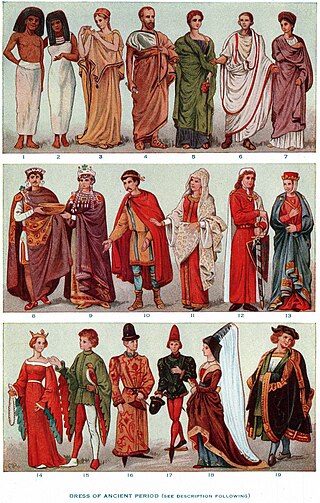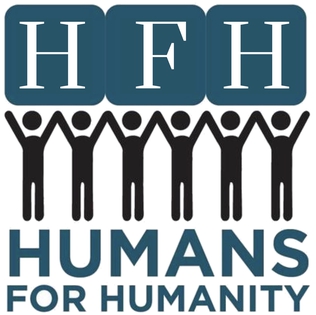
Clothing is any item worn on the body. Typically, clothing is made of fabrics or textiles, but over time it has included garments made from animal skin and other thin sheets of materials and natural products found in the environment, put together. The wearing of clothing is mostly restricted to human beings and is a feature of all human societies. The amount and type of clothing worn depends on gender, body type, social factors, and geographic considerations. Garments cover the body, footwear covers the feet, gloves cover the hands, while hats and headgear cover the head, and underwear covers the private parts.

A clothes hanger, coat hanger, or coathanger, or simply a hanger, is a hanging device in the shape/contour of:

The International Rice Research Institute (IRRI) is an international agricultural research and training organization with its headquarters in Los Baños, Laguna, in the Philippines, and offices in seventeen countries. IRRI is known for its work in developing rice varieties that contributed to the Green Revolution in the 1960s which preempted the famine in Asia.
Clothing in India varies with the different ethnicities, geography, climate, and cultural traditions of the people of each region of India. Historically, clothing has evolved from simple garments like kaupina, langota, achkan, lungi, sari, to perform rituals and dances. In urban areas, western clothing is common and uniformly worn by people of all social levels. India also has a great diversity in terms of weaves, fibers, colors, and the material of clothing. Sometimes, color codes are followed in clothing based on the religion and ritual concerned. The clothing in India also encompasses a wide variety of Indian embroidery, prints, handwork, embellishments, and styles of wearing clothes. A wide mix of Indian traditional clothing and western styles can be seen in India.

Aditya Birla Group is an Indian multinational conglomerate, headquartered in Mumbai. The group's business interests include metals, cement, fashion and retail, financial services, renewables, fibre, textiles, chemicals, real estate, trading, mining, and entertainment. The group has a presence in 36 nations and a combined annual revenue of US$62 billion, over 50% of which is derived from its overseas operations.

Cloth menstrual pads are cloth pads worn in the underwear to collect menstrual fluid. They are a type of reusable menstrual hygiene product, and are an alternative to sanitary napkins or to menstrual cups. Because they can be reused, they are generally less expensive than disposable pads over time, and reduce the amount of waste produced.

Aditya Birla Fashion and Retail Limited (ABFRL) is an Indian fashion retail company headquartered in Mumbai. It emerged after the consolidation of the branded apparel businesses of Aditya Birla Group, comprising ABNL's Madura Fashion division and ABNL's subsidiaries Pantaloons Fashion and Retail (PFRL) and Madura Fashion & Lifestyle (MFL), in May 2015. Post consolidation, PFRL was renamed Aditya Birla Fashion and Retail Ltd.

Deepalaya is an Indian non-governmental organization that aids the development of the urban and rural poor in India, with a focus on children. Founded in 1979, it is headquartered in Delhi. Deepalaya primarily serves the urban slums of Delhi, but also works on rural development in the states of Haryana and Uttarakhand. Deepalaya's focus is on sparking sustainable development from within a community.

Indian Institute of Mass Communication (IIMC) is a deemed-to-be-university, established on 17 August 1965, Delhi. The Institute has five regional centers across India. The IIMC is an autonomous society under the Ministry of Information and Broadcasting. The institute offers PG Diploma courses in media subjects like Journalism, Radio and Television, Advertising & Public Relations and Digital Media. On Jan 31, 2024, the Institute has been granted Deemed university status.

Deep Joshi is an Indian social worker and NGO activist and a recipient of the Magsaysay award in 2009. He is recognised for his leadership in bringing professionalism to the NGO movement in India. He co-founded a non-profit organisation, Professional Assistance for Development Action (PRADAN), of which he was the Executive Director till 2007. He was awarded the 2009 Magsaysay award for Community Leadership for his work for "development of rural communities". He is also a recipient of the civilian honour of Padma Shri.

Daan Utsav was formerly known as The Joy of Giving Week. The Joy of Giving Week (JGW) is a "festival of philanthropy" that aims to become a part of the Indian ethos, with the Week being celebrated every year covering Gandhi Jayanti by engaging people through "acts of giving" - money, time, resources and skills - spanning the corporate, NGO and government sectors, schools, colleges and the general public. Originally called "India Giving Week", the name "Joy of Giving Week" emerged from a set of choices provided by the ad agency, Euro RSCG India, which provided PR, creative and media services for the ‘Joy of Giving Week’.

JAAGO Foundation is a non-profit organisation based in Bangladesh dedicated to providing quality education and social development opportunities to underprivileged children and communities. Established in April 2007 by Korvi Rakshand, the foundation has become a leading force in addressing issues related to education, poverty alleviation, and youth empowerment in the country.
Kulandei Francis is an activist, social worker, and the founder of the NGO Integrated Village Development Project in Tamil Nadu, India. He was one of six recipients of the Magsaysay Award in 2012 for "his profound faith in community energies, and his sustained programs in pursuing the holistic economic empowerment of thousands of women and their families in rural India".
LAUNCH is a program sponsored by NASA, Nike, US Agency for International Development, and the US Department of State that seeks sustainable innovations through quasi-annual challenges, forums, and a business accelerator. The program began in 2010 and has since focused on themes such as energy, health, water, and waste solutions.
Tamana is a non-profit voluntary organization, registered in 1984 in India, consisting of three special education centers, a training cell and a research center to support individuals with intellectual and developmental disabilities. The organization's work is recognized by the Ministry of Social Justice and Empowerment, Government of India, Government of Delhi, Rehabilitation Council of India and is registered with the National Trust. Tamana also has a Special Consultative Status within the United Nations Economic and Social Council since 2005.

Anshu Gupta is an Indian entrepreneur. He founded the non-governmental organization Goonj. Goonj works on bridging urban and rural inequality. It does this by channelizing the urban surplus to initiate rural upliftment, disaster relief, and rehabilitation. Through Goonj, Anshu is building a parallel trash-based economy by creating barter between rural communities and urban surplus material. Anshu has been recognized by the Ramon Magsaysay foundation for his "creative vision in transforming the culture of giving in India".

Anurag Chauhan is an Indian social worker and founder of Humans For Humanity, a non-governmental organization (NGO) headquartered in Dehradun, India He is known for social work, particularly with regards to menstrual hygiene. The WASH project started by him has reached over 3.5 million women in over 6 states in last 5 years.
Donatekart is an India-based social enterprise that allows individuals to donate supplies needed to a charity instead of donating money. The organization was founded in 2016 by Anil Kumar Reddy and Sandeep Sharma. Donatekart act as an online crowdsourcing platform that assists non-governmental organizations to create campaigns and collect products they require from donors instead of traditional monetary donations. Donatekart is the first of its kind in the world that enables donors and philanthropist to directly donate required products to charitable organizations online instead of money. The organization was awarded with NASSCOM Social Innovation Award 2018 by K. T. Rama Rao, Minister for Information Technology, during World Conference on Information Technology held in 2019, in Hyderabad. Donatekart is incubated by Zone Startups India, an accelerator program run by Bombay Stock Exchange, Mumbai and T-Hub, Hyderabad.

Humans For Humanity (HFH) is a non-governmental organization, founded by renowned social worker Anurag Chauhan, headquartered in Dehradun, India. It is working to bring awareness about menstrual health, hygiene among women across India. It is providing health, hygiene and comfort to women, especially in poverty-stricken and rural areas in India. The organization empowers women by educating women and young girls on menstruation and menstrual hygiene, and by conducting workshops to produce low-cost sanitary pads. The WASH project started by Humans For Humanity has reached over 3 million women in over 6 states in India in the last 6 years, as of October 2020.
Eco Femme is a women-led social enterprise in Tamil Nadu, India, that produces organic washable cloth pads. Eco Femme was founded in 2009 in Auroville by Kathy Walkling and Jessamijn Miedema who started by producing, applying and selling these washable menstrual pads in Auroville. The aim was to produce pads that are both affordable and free of plastic. They were also interested in designing a sustainable alternative to disposable pads for the women of India as well as setting up self sustaining initiatives in cloth pad production for women from the neighbouring villages. All commercially sold pads are organically certified under GOTS and Eco Femme is the first in this space to have achieved this certification. The cloth pads are mostly made out of organic cotton and can last up to 75 washes or for three to five years from the time of purchasing. These pads are sold in more than 20 countries across the world. By 2022, Eco Femme has distributed over 1 million cloth pads which consequently saved more than 75 million single use disposable pads from reaching landfills.














